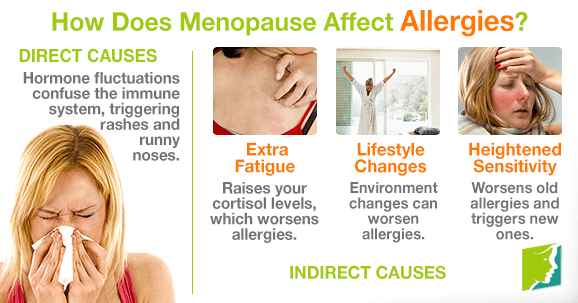Many women can be caught off guard by a sudden heightened sensitivity to allergies, and often they do not realize menopause has a role in this. However, menopause carries direct and indirect reasons as to why allergies become more prominent during this time. Continue reading to discover what the relationship between menopause and allergies are, how menopause can trigger allergies, and what you can do to help reduce your symptoms.
Direct Causes
Menopause can be a direct cause of heightened sensitivity to allergies.
Immune system
Hormones and the body's immune system are intricately connected, so when hormone levels fluctuate during menopause, your immune system is thrown into disarray. When you have an allergy, it is your body reacting to an unknown, but usually harmless, substance. However, your immune system mistakes it as a threat and creates antibodies to defend itself. This results in the physical symptoms commonly associated with allergies, such as sneezing, rashes, and a runny nose.
Indirect Causes
In addition to menopause's effect upon your immune system being a direct cause of allergies, menopause and its other symptoms can also provide indirect causes for them.
Extra fatigue
The 34 symptoms which accompany menopause can cause women to become stressed more easily, as well as cause irritability and mood swings. This combination of factors can raise your cortisol levels. Raised cortisol levels can both cause and worsen new allergies, and so you can be particularly exposed to them during menopause.
Heightened sensitivity
If you already suffered from an allergy before you reach menopause, then you are more likely to experience a heightened sensitivity to your allergies. Alternatively, if you have never suffered from allergies before, you might find that you are suddenly developing a new one. The extent of symptoms will vary from woman to woman, some discovering that they only have mild symptoms of a new allergy, while others might have more severe reactions.
Lifestyle changes
Menopause can heavily affect a woman's lifestyle. Some of its symptoms, such as hot flashes or body odor, drive women to experiment with new toilet products or to keep more windows open. In turn, this can increase exposure to certain allergens (such as pollen or harsh cleaning agents), and worsen the symptoms of allergies.
Menopause can take women by surprise, as most are unaware that it can lead to new or increased allergic reactions. This happens due to both direct and indirect reasons, but the effects can be combated to an extent by introducing some lifestyle changes. The best way to cope with these new allergies is to discover what causes them and why.
Sources
- National Health Service UK. (2012). Allergies - Symptoms. Retrieved October 11, 2013, from http://www.nhs.uk/Conditions/Allergies/Pages/Symptoms.aspx
- Patterson, A., Yildiz, V., Klatt, M., Malarkey, W. (2014). Perceived stress predicts allergy flares. Annals of Allergy and Asthma Immunology, Apr;112(4):317-21. Retrieved May 24, 2014 from http://www.ncbi.nlm.nih.gov/pubmed/24428966


